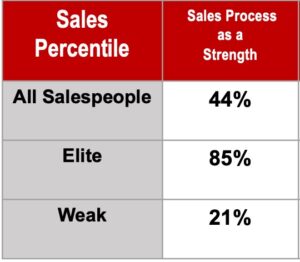- March 21, 2024
- Posted by: Dave Kurlan
- Category: Understanding the Sales Force

Although this is an article about sales process, the first two paragraphs have more to do with religion than sales. To fully understand this powerful analogy, you’ll want to read the next three paragraphs and allow me to make my case. It will be worth it!
My wife thought I would enjoy a book she found at the airport bookstore and I agreed that it looked compelling. Cold-Case Christianity is a book by J. Warner Wallace where he used his skills as a cold-case homicide detective to examine the claims in the Gospels in the New Testament. A book like this might not be the perfect read for you, but as a former Jew that converted to Catholicism twenty-two years ago at age forty-six, I found it helpful, useful, insightful, powerful, and conclusive. I’m sure by now you’re thinking, but Dave, what the heck does that have to do with sales process? We’re almost there.
The author admits that until he conducted his “cold-case investigation” into the New Testament, he was an atheist, a true non-believer. As a detective, he always followed the evidence to find the truth. Similarly, many prospects are also non-believers in your product or service. As I read and learned about the author’s methods for uncovering the truth, or proof, I felt that salespeople could learn a lot about proof of concept, presenting facts, backing up claims, return on investment, and offering credible testimonials. But that’s not the analogy I’m going to make.
Wallace shared a story about the time he was shot at a traffic stop. Up until the moment of the shooting, Wallace believed that a bullet-proof vest would stop a bullet and save his life. In the moment of the shooting, he believed in the bullet proof vest’s ability to stop a bullet and save his life. At that moment his belief changed from “belief that” to “belief in.” That was the analogy he wished to apply to the gospels. He wondered if he could find the evidence to replace faith (belief that the miracles occurred) with proof (belief in both the miracles and the resurrection).
That also happens to be my analogy. Most salespeople believe that a sales process can help them succeed while the very best salespeople believe in their sales process.
I mined some data from Objective Management Group, which has assessed around 2.5 million salespeople. In the table below, you can see that 44% of all salespeople are strong in the Core Competency, Sales Process. Most of that group believes that a sales process is helpful. You can also see that only 21% of the weakest 50% of salespeople are strong in the Core Competency, Sales Process. On the other hand, most – 85% – of the top 5% of all salespeople – the elite – have sales process as a strength. Those salespeople believe in their sales process and follow it as if their life depends on it. It is their bullet-proof vest!

An effective, customized, optimized, multi-stage, milestone-centric, customer-focused Sales Process should be a game changer. But because most companies and salespeople merely believe that a sales process will help, it’s not the game changer that it is for those who believe in their sales process. For example, when we customize a sales process complete with a custom scorecard, our clients have achieved on average, a 20% increase in sales. That’s due in part to the process and also to the sales leaders holding their salespeople accountable for using the sales process. It doesn’t happen on day one, but the salespeople quickly develop a belief in the sales process.
I could go on and make the exact same case for some of the other twenty-one Sales Core Competencies like Hunting – a belief that hunting will help build the pipeline versus the belief in hunting to build the pipeline
“Belief that” versus “belief in” holds true for Reaching Decision Makers, Relationship Building, Consultive Sales Approach, Selling Value, Qualifying, Presentation Approach, Closing, and Sales Technology as well.
How can sales organizations, sales enablement, sales cultures, and sales leadership make the paradigm shift to move from “Belief That” to “Belief In?”
A sales team evaluation should be the first step because it identifies all of the competencies where the salespeople do not yet “believe in.”
Sales Transformation transforms the culture so that it becomes a “believing in” culture. This begins with training and coaching Sales Leadership to lead and support such a culture. Salespeople need to be trained too, but just as much time needs to be spent on beliefs as it does on Sales Process, Sales Methodology, Sales Strategy, and Sales Tactics. And then? Practice. Practice. Practice. Role Play. Role Play. Role Play.
Are you ready?
I know you believe that this could help. Do you believe in my ability to help you get there?
Image Copyright 123RF

